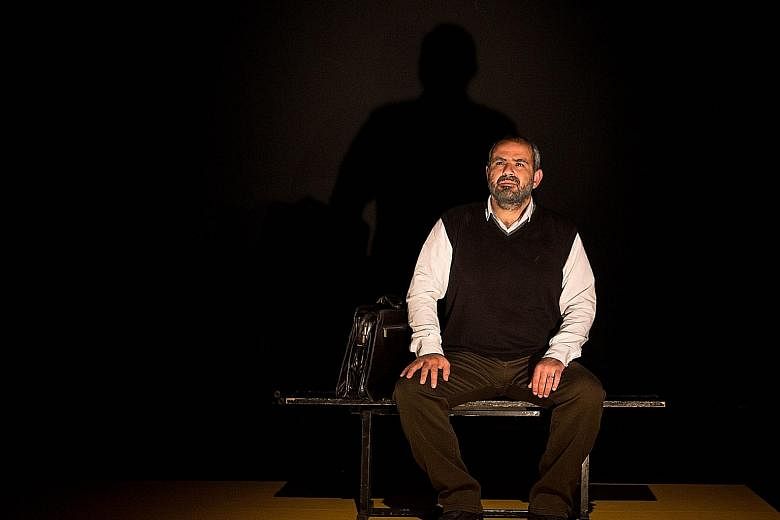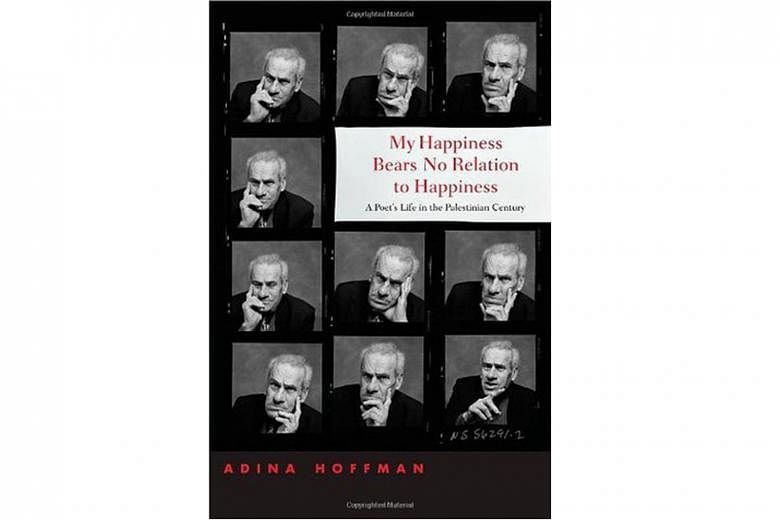"When our loved ones leave us... as you left," writes the Palestinian poet Taha Muhammad Ali, "an endless migration in us begins."
The endless migration began for 17-year-old Taha in 1948, when he and his family fled their village of Saffuriyya after it was bombed in the Arab-Israeli War. On foot, they travelled from Galilee to Lebanon, where they lived in a refugee camp for about a year. When he finally returned to Palestine, he found it had become Israel.
There is a silence around the Nakba - as the exodus of the Palestinians came to be called - that is hard to penetrate, even as it reaches its 70th anniversary this month.
Palestinian writer-actor Amer Hlehel wants to give this silent generation - that of Taha, and his grandparents - a voice.
His one-man play Taha, which will be staged as part of the Singapore International Festival of Arts this weekend, tells the life story of the late poet. At another event, Verses Of Love And Life, local performers under the direction of theatre practitioner Aidli Mosbit will recite Taha's poetry.
Taha's poetry spoke about the pain and the loss of the Palestinian people through his human, personal story, writing in a deep, tender way without being political, says Hlehel, 38, over the telephone from his home in Haifa.
"You can identify with his poetry without being Palestinian. You just have to be human."
-
BOOK IT / TAHA
-
WHERE: KC Arts Centre - Home of Singapore Repertory Theatre, 11 Unity Street
-
WHEN: Friday and Saturday, 8pm
-
ADMISSION: $35 from ticketing. sifa.sg. Limited concessions available. Limited student tickets at $10
-
INFO: www.sifa.sg
-
VERSES OF LOVE AND LIFE - SELECTED POEMS OF TAHA MUHAMMAD ALI
-
WHERE: Living Room, Arts House, 1 Old Parliament Lane
-
WHEN: Friday, 8pm; Saturday, 6.30pm
-
ADMISSION: Free with registration at versesofloveandlife.peatix.com
He first encountered Taha's poetry as a teenager in drama school, and was struck by the similarities between Taha and his own grandfather, who was also displaced from his village in northern Palestine in 1948 and fled to Lebanon for a year. When he sneaked back into Palestine, he found his village destroyed and tried to rebuild his life in another village a few kilometres away.
"My grandfather didn't tell me anything about the Nakba," says Hlehel. "When I was a teenager, I started to read about it and I went to him to try to understand what happened and he never said anything about it. He died with his silence."
Taha, too, writes about the Nakba obliquely. "We did not weep/ when we were leaving," he writes in his poem There Was No Farewell, "for we had neither/ time nor tears... We did not know/ at the moment of parting/ that it was a parting/ so where would our weeping/ have come from?"
In the refugee camp, his 12-year-old sister died suddenly of meningitis. When they decided to chance a return home lest his mother go mad, he left behind his childhood sweetheart, to whom he had been pledged from young. They would not meet again until they were in their 50s and married to other people.
When he began to write poetry, she became his muse. He describes her often as a bird, a "dove who travelled on the train of winter", winging her way to the homeland she could not return to as a human.
In Nazareth,Taha ran a souvenir shop and devoured books in his spare time, from classical Arabic literature to American fiction. He married his neighbour's daughter Yusra Qablawi. They had three children.
His poetry did not draw much attention at first, compared to that of his more celebrated peers such as Mahmoud Darwish and Samih al-Qasim. It was not until the 1990s that he began to be noticed at literary festivals.
In 2006, his work was translated into English by American poet Peter Cole in the collection So What: New & Selected Poems, 1971-2005. Cole's wife Adina Hoffman went on to write a biography on Taha, My Happiness Bears No Relation To Happiness (2009).
It was Hoffman's biography that gave Hlehel the material to write his play. He had not met Taha in life, although he had heard him speak onstage and attended his funeral in 2011.
The character he plays onstage is a mix of the Taha from the biography and Taha as recounted by the poet's relatives, whom he has befriended. "It is not meant to be Taha copy-pasted, but rather my perspective of him as a poet and a human being."
The play arrives in Singapore amid rising tensions along the Gaza-Israel border, where tens of thousands of Palestinians have been protesting in the lead-up to Nakba Day on May 15. Last Friday, three Palestinians were killed by Israeli fire, the latest in clashes that have seen 44 Palestinians killed since March 30 and hundreds wounded.
"We are experiencing Nakba every day in Palestine, in the history we feel around us," says Hlehel, who is married with a daughter, four. "It is an open wound."
He hopes that through Taha, he can change the way people around the world think of Palestine. "From what they know from headlines and newspapers, they think we are just a part of an ugly political conflict. But behind this conflict, we are people with our stories."
•So What: New & Selected Poems, 1971-2005 ($26.74) and My Happiness Bears No Relation To Happiness ($32.68) are available from Books Kinokuniya.



